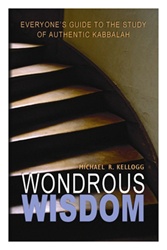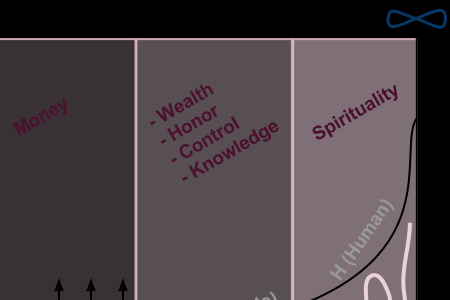Spirituality. The very word causes a cavalcade of descriptions, ranging from what we find at the bottom of a bottle of tequila, to religion, to cults, to ghosts and goblins. Yet what is this thing we call “spirituality”? Is it a place such as heaven? Is it a religion such as Christianity, Judaism or Islam? Is it a condition? Is it a state of mind? Or is it a combination of all of the above?
If we consider the lack from which we suffer, we can narrow it down a bit. Whatever spirituality is, it is definitely not here, not in this world where we live, eat, sleep, breathe, and fulfill a generous amount of our desires.
Having been examined from a variety of directions, almost everyone agrees on one point: spirituality is where the “soul” resides. In other words, it is the soul’s environment. That is all well and good, but it also defines nothing until we know what a soul is.
In general, there are four common attitudes regarding the soul, as well as our existence here in the physical and the spiritual. Those four attitudes are religious, secular, scientific, and philosophical.
What Is the Soul?
Religious Approach
Clothed within each and every one of our physical bodies is an eternal entity called a “soul.” The soul is eternal, and as an object has virtually nothing to do with the world in which we physically live, unless it inhabits a body. It has a completely independent existence from the physical body and exists before, during and after the physical body’s existence.
The soul is not a “body” as we know it, having no organs or physical attributes, and can therefore be considered “whole” or undivided.
The body itself is simply a physical and biological substance with no characteristics of its own until the soul inhabits it. The inhabiting by a soul within a body is called physical “birth” and the leaving of a soul from a physical body is called “death.” Without the soul, the body could not move or interact in any way because the soul is responsible for the body’s life and motion.
Secular Approach
This approach is also known as the “dualistic” approach to explain the soul’s existence, as well as to explain our physical existence.
Certainly souls do inhabit bodies, but they do not necessarily have to in order for the physical body to exist. The biological body can exist as a totally independent unit, able to perform all functions of life. It exhibits qualities of its own, albeit none that are spiritual.
In order to actually have any spiritual qualities, the soul must inhabit the body, just like in the original religious concept. And since the soul is a spiritual entity, the body is the recipient of only good qualities when inhabited by the soul. Otherwise, it is simply like any other animal, until that point when it is inhabited by the soul. But the soul is the actual controlling force because it is what causes the body to be born and maintains it as well.
Scientific Approach
This approach is also known as the “non-believer” attitude. Basically this idea denies any existence of a soul or spirituality altogether. In fact, the only thing that exists is what is here, what can be seen or detected physically. Every event the body performs is a function of calculations of the brain with regard to pain and pleasure. Data is received through our senses and analyzed by the brain, which then determines whether what is being sensed causes pain or pleasure.
So in this view, what separates us from animals? The difference between us and, say, the devoted pet that lies at your feet is simply the advanced development of the human brain. The human brain analyzes and acts on hundreds of thousands of times more data than that of your animal companion. This massive amount of analysis is how we “reason” and is responsible for our superiority over every other creature.
Of course, this approach is far and away the most scientific. It relies totally on what we have in front of us, what we can see or detect with scientific experiments.
The downside to this approach is that this removes any romantic idea of humankind and relegates us to being mere slaves of our environment, constantly calculating pleasure versus pain. Any concept of free will goes right out the window as all our actions are merely a combination of our initial genetic makeup and our environment.
Philosophical Approach
The “philosophical” or “modern” concept takes the best of all three concepts and attempts to provide an explanation for our physical and spiritual existence. Yes, the soul does exist. Yes, the soul is the real “us.” Yes, the soul is an eternal and spiritual being. Yes, our genetic makeup and environment strongly affect how we are here. Of course, once again, we have raised many more questions than we have answered, even if we combine all three of these definitions.
The General Failure in Defining “The Soul”
At the end of the day, the three concepts that accept the existence of the soul fail to explain how it is related to the body in this world. We are most comfortable with what we can see, hear, smell, touch, and feel. Yet the scientific version of spirituality leaves this incredibly strong sense of lack completely unanswered.
Here we find ourselves struggling with an age-old dichotomy. We want to believe in spirituality and the soul, but we have absolutely nothing concrete to base it on.
If we apply our normal reasoning to the problem, our logical conclusion is too painful for most of us to stomach. To break down the problem to the basics, we cannot logically say we “accept” the existence of something unless we actually experience it. Our only solution would be to somehow experience the perception of something spiritual, yet we have no concrete real way of perceiving what we define as the “spiritual”…or do we?
 “What Is Spirituality?” is based on the book, Wondrous Wisdom: Everyone’s Guide to the Study of Authentic Kabbalah by Michael R. Kellogg.
“What Is Spirituality?” is based on the book, Wondrous Wisdom: Everyone’s Guide to the Study of Authentic Kabbalah by Michael R. Kellogg.

